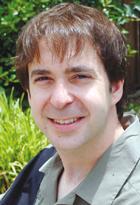|
MARGO ROAD NATIVE A PRIZE-WINNING POET
 |
| Garrett
J. Brown, pursuing his doctorate at the University of Illinois at
Chicago, relaxed last month during a weekend visit home. photo by Roland Dorsey |
Local landscape was inspiration for earlier work
by Michelle Ruddle
Finding
a temporary respite from the blazing sun, poet Garrett J. Brown looked
mellow and cool as he relaxed in the gazebo in the back yard of his
parents' Margo Road home.
Brown handled a sweating glass of iced
tea as he discussed his work, including a recent poetry award and his
days as a budding writer in the shadow of Baltimore's imposing
industrial landscape.
Brown's first forays into poetry began with an attempt to process the environment around him, he said.
"I
started with place poems and tried to make a connection with the
landscape," especially places like Sparrows Point, he said. "I would
try to get a feel for what the land looks like and the setting blended
with ideas about religion and bigger questions."
They're
topics that still weave their way through Brown's work periodically,
though he has taken to exploring the inner depths of the mind in his
recent poetry.
"I've been focusing on brain science, the way
memories are formed and how we create memories," he said. "I see poetry
and science doing the same thing for us as far as observing the world."
Though it's a notion that "goes against the common perception," it's served Brown exceptionally well.
Just
two months ago, Brown won first place in the 11th annual Juried Reading
Contest held by the Poetry Center of Chicago. The competition was open
to poets in Illinois - where Brown now resides while pursuing a
doctorate at the University of Illinois at Chicago - and seven
surrounding states.
In awarding Brown highest honors in the
competition, the final judge, Pulitzer Prize-winning poet Jurie Graham,
said of his entry, Opposition, "The images are appropriate and
beautiful, the use of metaphor appropriate. ... Brown exhibits, in
addition to a command of form, intelligence, deep heartfullness and no
fear of learnedness."
Other recent accomplishments for the Our
Lady of Hope School alumnus, who went on to attend Archbishop Curley
High School, St. Mary's College and the School of the Art Institute of
Chicago, include publishing a chapbook, Panning the Sky, in 2003 and
receiving runner-up honors in the 2003 Maryland Emerging Voices
competition for Manna Sifting, a book-length manuscript.
Another
recent success was securing a job as an English professor at the
University of Illinois at Chicago. While first-year composition courses
and coursework for his doctorate keep him busy, Brown said he doesn't
mind too much.
"I had fallen in love with Chicago," Brown said, and the deadlines give him an extra push to work on a full-length work.
Next
semester, Brown will teach a section of Creative Writing, an endeavor
that he's looking forward to as a way to advance the increasing
popularity of creative writing as an academic science.
One of the lessons Brown will stress to his students, he said, is the importance of experimenting with poetic form.
"I made myself learn how to write with different forms," he said. "I think it's important to know the basics of it."
Learning
those basics allowed Brown to move from more formal types of poetry -
and a play written entirely in iambic pentameter - to the vignettes and
smaller stanzas that mark his work now.
It also allows him to be more open-minded and aware of which direction the poem needs to take to be successful.
"I let the language and content of the poem determine what form it will be," Brown said.
Another
thing Brown will stress to his students is the importance of getting
out into the world. Before settling into his teaching position, Brown
worked as a reporter, a temp and a port employee.
"It helped me get a good grasp of the different stuff that's out there in the world."
Childhood
memories and experiences have been a constant source of inspiration for
him, Brown said, though how his work approaches them has changed over
time. Brown makes a point to stop into town a few times a year, and the
landscape of his childhood home makes its way into his work often.
"One
of the things I'm working on involves North Point Road," he said.
"Things pop up here and there. It's unpredictable what's going to
emerge in a poem."
Forging
Two o'clock outside the plate mill,
men trickle out in worn jeans,
remove hard hats and light
cigarettes. Their eyes are pig iron,
their skin cooled slag; they lean
and smoke against a concrete wall.
My grandfather laid brick, raised
these city walls with his hands
(cement under his nails, fingerprints
on each block) and a few tools
that now sit in their red dust, silent
in my grandmother's garage.
The steelworker feels this landscape
in his body - ore bridge ribs,
arms skip-hoist thin and a belly
bloated with coke and limestone,
a smoldering oven banked inside.
For thirty years my father survived
layoffs, union disputes, soot
on the cars and soot in his lungs.
He worked as his father worked, shipping,
forging steel, the steel that forged
this town. Driving the beltway
in a car of foreign alloys and plastic,
I watch Sparrows Point surrender
its last gray breaths to the air
and approach the Key Bridge,
a steel arch that spans the distance
we must cross to forge a metal
less defined.
From Panning the Sky, a chapbook published by Pudding House Publications.
|





